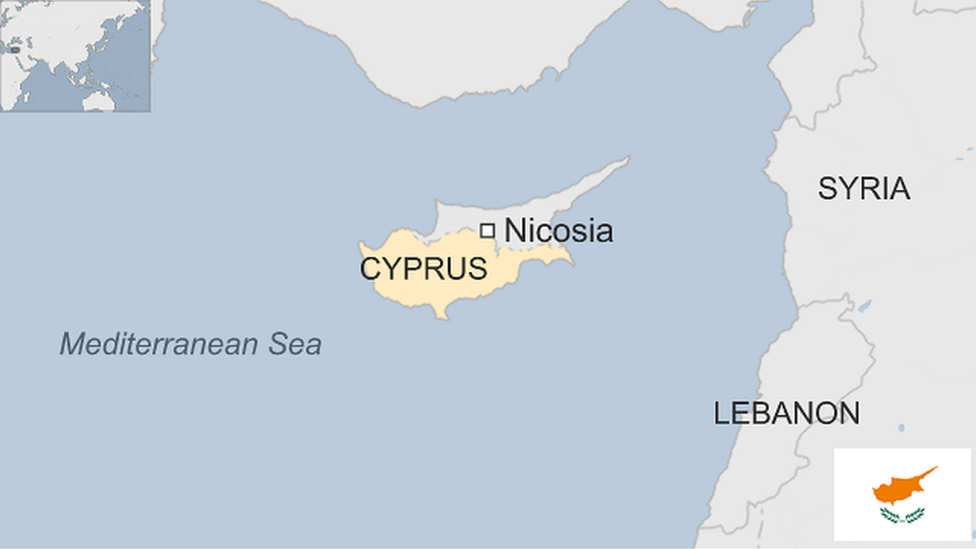Greece country profile
- Published
This page is no longer being updated. It was last updated on 28 June 2023
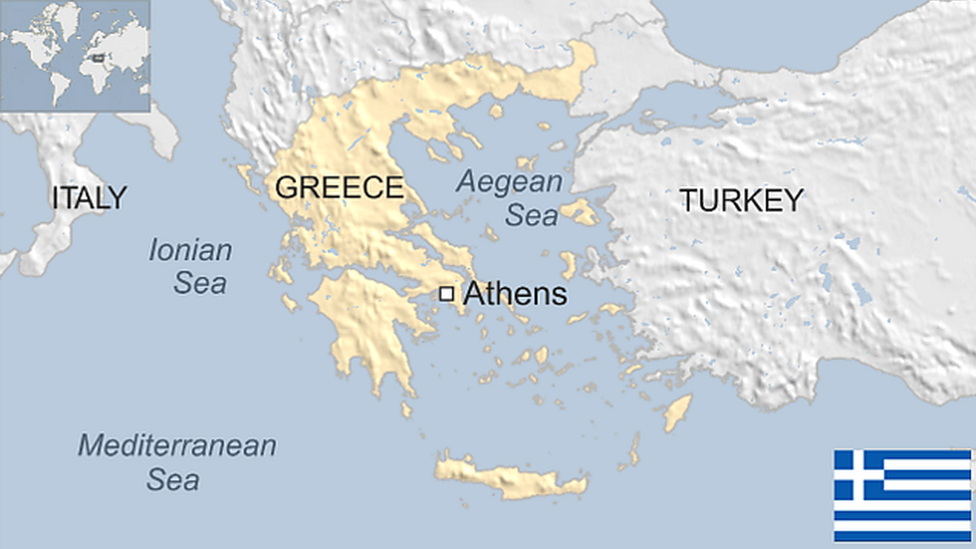
The historical and cultural heritage of Greece continues to resonate throughout the modern Western world - in its literature, art, philosophy and politics.
Situated in the far south of the Balkan peninsula, Greece combines the towering mountains of the mainland with over 1,400 islands, the largest of which is Crete.
Post-World War Two Greece saw rapid economic and social change, with tourism and shipping becoming major contributors to the economy.
The global financial crisis of the late 2000s had a devastating effect on Greece, as the legacy of high public spending and widespread tax evasion combined with the credit crunch and the resulting recession to leave the country with a crippling debt burden.
Read more country profiles, external - Profiles by BBC Monitoring, external
HELLENIC REPUBLIC: FACTS
Capital: Athens
Area: 131,957 sq km
Population: 10.46 million
Language: Greek
Life expectancy: 78 years (men) 83 years (women)
LEADERS
President: Katerina Sakellaropoulou

Katerina Sakellaropoulou was elected president by parliament in January 2020, and took office in March, becoming Greece's first female head of state.
Prior to her election, she was president of the Council of State, the country's highest administrative court.
The presidency is a largely ceremonial post, as executive power resides with the prime minister.
Prime Minister: Kyriakos Mitsotakis
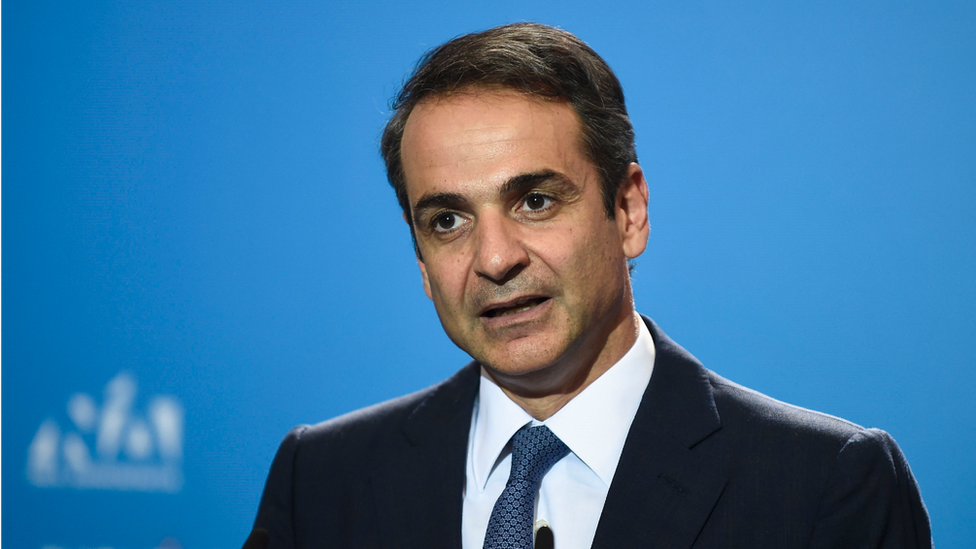
In June 2023, conservative leader Kyriakos Mitsotakis beat his centre-left rival in Greece's second election in a month. He said the election result gave him a "strong mandate" to move faster on the path of change.
His New Democracy party (ND) won 40.5% of the national vote, almost 23 points ahead of Alexis Tsipras's Syriza party, which got just under 18%. He beat Syriza in May 2023, but called new elections in a bid to win a majority.
Mr Mitsotakis has been credited with successfully returning the Greek economy to stability and growth after a severe debt crisis and three international bailouts.
Although many Greeks are struggling with the cost-of-living crisis, voters chose to stick with the party promising lower taxes and improved public health.
Mr Mitsotakis said he could not promise miracles, but that New Democracy had "high goals" to transform Greece with a better public health service and education.
One of the big stories of the election was the success of a newly created far-right Spartans party, which won almost 4.7% of the vote, crossing the 3% threshold to enter parliament.
The Spartans only emerged as a political force in June 2023 when the Supreme Court banned another far-right party, the Greeks, and its jailed founder, Ilias Kasidiaris, threw his weight behind the Spartans.
Kasidiaris had been the spokesman for neo-Nazi party Golden Dawn, which was banned as a criminal organisation and its leaders given long prison terms.
Together with nationalist Greek Solution and ultra-conservative Niki (Victory), the three hard-right parties won close to 13% of the vote and 34 seats.
MEDIA

Television is Greece's most popular medium. Established privately-owned networks operate alongside the public broadcaster ERT.
The government has sought to regulate the TV sector, and five national networks were licensed in 2018.
Press freedom in Greece suffered serious setbacks in 2021 and 2022, according to the media rights group Reporters Without Borders, external, with journalists regularly prevented from covering issues from migration to Covid-19.
Read full media profile
TIMELINE
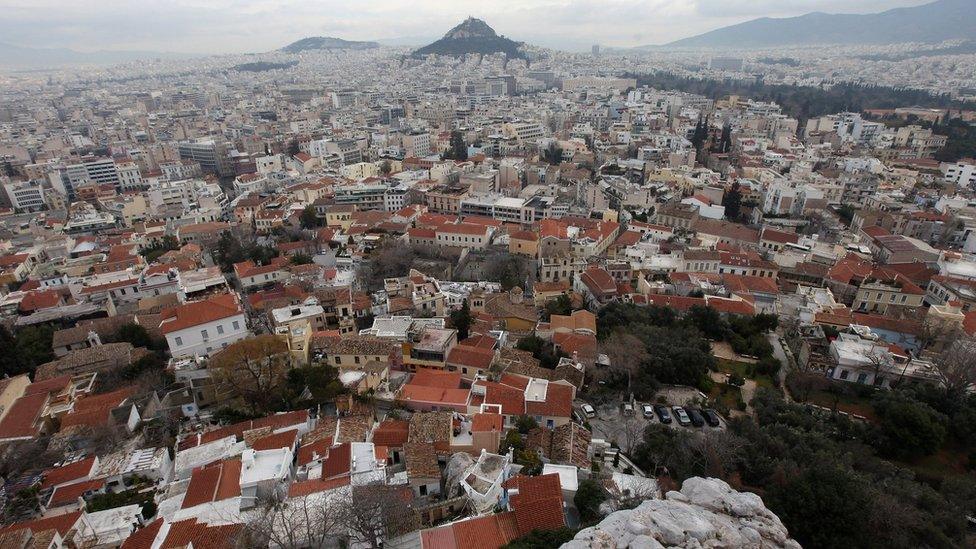
A view of Athens from the Acropolis
Some key dates in modern Greek history:
1821-1829 - Greek War of Independence from Ottoman Empire.
1832 - Prince Otto of Bavaria is chosen as the first king of independent Greece.
1913 - Greece gains Epirus, Macedonia, Crete and the North Aegean Islands from the Ottomans in the First Balkan War, and then West Thrace from Bulgaria in the Second Balkan War.
1919-22 - Greco-Turkish War - Greek invasion of Asia Minor prompted by the collapse of the Ottoman Empire after World War One is defeated by Turkish forces.
1936 - General Ioannis Metaxas appointed prime minister, establishes right-wing dictatorship.
1940 - Italian dictator Benito Mussolini's forces attack Greece from Italian-held Albania, but are repelled.
1941 - Metaxas dies. Greece falls to German forces. More than 100,000 die in famine.
1942-1944 - Fierce resistance to the occupation by communist and royalist factions alike.
1944 - British and Greek forces combine to force Nazi withdrawal.
1946-1949 - Royalist parties win elections. Ensuing civil war ends with defeat of communist forces.
1952 - New constitution declares Greece a kingdom ruled by parliamentary democracy. Greece joins Nato.
1967 - Group of army officers seize power in military coup. Elections are postponed indefinitely and Col George Papadopoulos takes office as prime minister.
1973 - Greece declared a republic, the monarchy is abolished and Papadopoulos assumes the presidency.
1974 - A Greece-backed coup against President Makarios of Cyprus is followed by Turkish invasion and occupation of north of the island.
1975 - New constitution declares Greece a parliamentary republic with some executive powers vested in a president.
1981 - Greece joins EU.
1991 - Yugoslav former republic of Macedonia declares independence. Greece objects to name and flag of Republic of Macedonia on grounds they imply territorial claims to the Greek province of Macedonia.
1996 - Tension flares between Greece and Turkey over disputed Aegean islet.
1999 - Earthquake hits Athens - dozens killed, thousands left homeless.
2000 - Senior British diplomat Brigadier Stephen Saunders shot dead in Athens by left-wing guerrilla group November 17.
2002 - Euro replaces drachma. Greek, Turkish governments agree to build gas pipeline through which Turkey will supply Greece with gas.
2002-2003 - Suspected leader and members of November 17 terror group arrested. Head of group and its main hitman jailed for life.
2004 - Athens hosts Olympic Games.
2007 - Wildfires sweep through tinder-dry forests across the mainland and islands, killing dozens of people.
2009 - Around 10,000 people are evacuated from their homes as wildfires sweep across the country.
2008 - World credit crunch plunges Greece into a severe government debt crisis, resulting in tight austerity and a dramatic fall in living standards.
2010 - Fears of a possible default on Greece's debts prompt eurozone countries to approve a 110bn-euro rescue package.
2011-2012 - Debt crisis deepens. EU leaders agree a major bailout for Greece, and then a 50% debt write-off in return for further austerity. Against a background of violent protests on the streets of Athens, parliament approves a new package of tough austerity measures as the price of a 130bn euro bailout.
2015 - Greece and its creditors agree a third bailout worth 86bn euros, imposing further spending cuts to avoid bankruptcy and exit from the eurozone.
2018 - Macedonia and Greece sign an historic agreement resolving 27-year-long dispute over the former Yugoslav republic's official name, which changes to the Republic of North Macedonia in 2019.
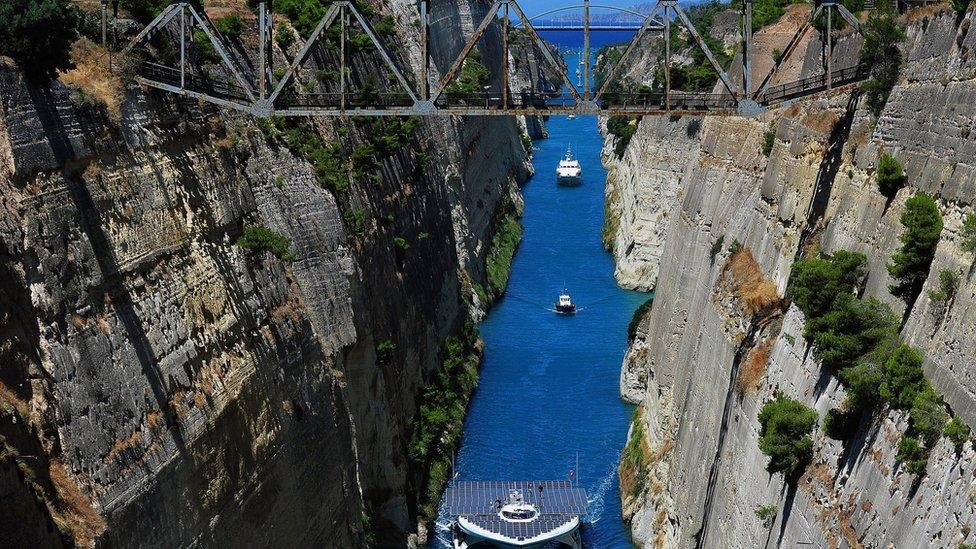
Ships pass through the Corinth canal
Related topics
- Published4 October 2023
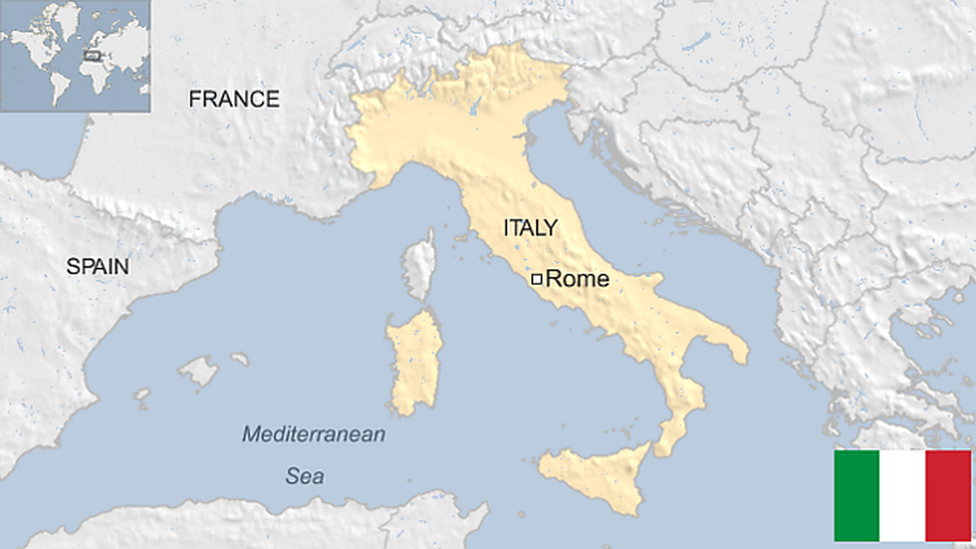
- Published28 June 2023
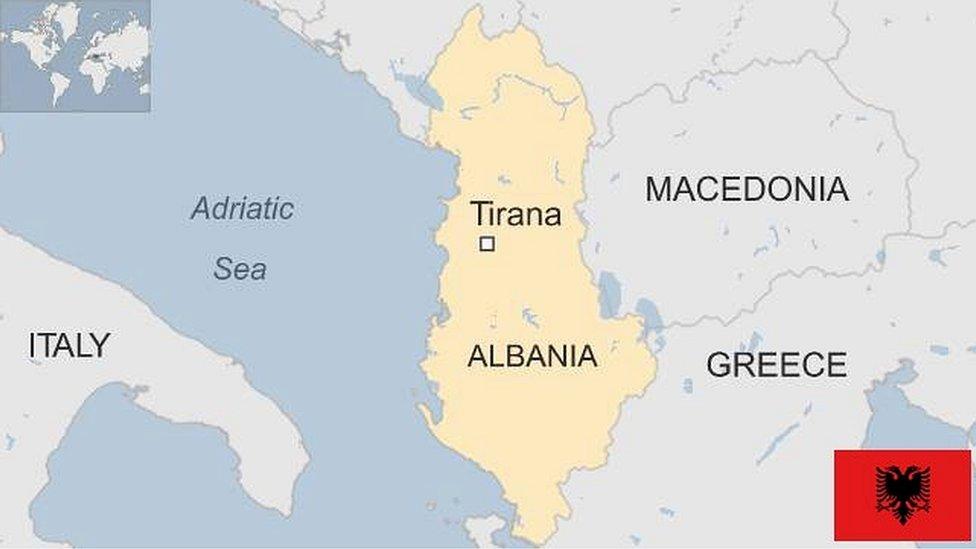
- Published10 June 2024
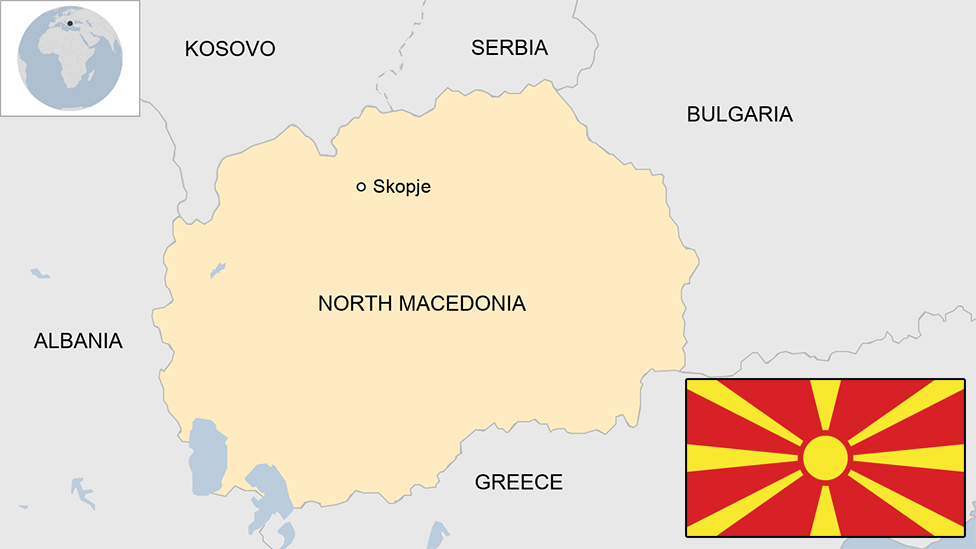
- Published20 January
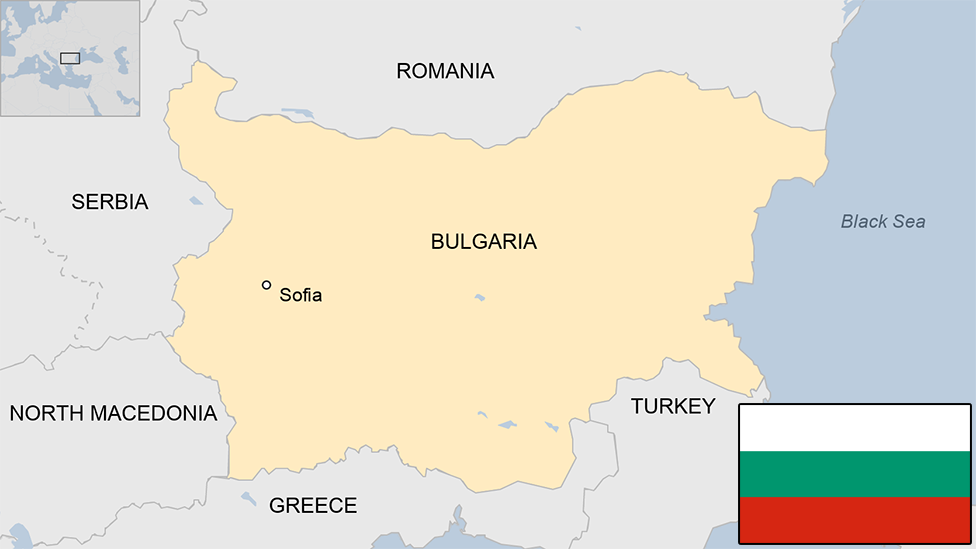
- Published22 August 2023

- Published7 April 2023
